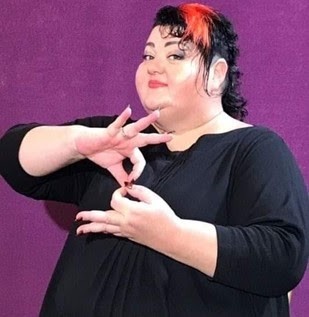Speeches Shim

Nataliya Moskovets is a sign language interpreter with 25 years of experience who became a civil activist. She specializes in court interpretation, so she knows better than anyone how difficult it is for people with disabilities to receive proper court services.
"Until recently, when a person with a hearing impairment received a summons or had to appear in court, they had to find an interpreter and pay for the services on their own. Or they could contact the society for people with hearing impairments, and it might provide an interpreter free of charge, if one was available,” said Ms. Moskovets.
According to the Ukrainian Society of People with Impaired Hearing (UTOG), there are only 245 sign language interpreters in all of Ukraine, often making it difficult for people with hearing impairments to receive professional-level services when needed. Adding to the challenge, court-goers must often wait several hours for their scheduled appearance, which resulted in the interpreter leaving for another appointment prior to the case reaching the courtroom.
The interpreters themselves also faced difficulties.They usually entered the courtroom with no understanding of the issue they were to interpret, which could make it more difficult for them to support their client. For example, only after she attended a USAID New Justice activity training did Ms. Moskovets understand that she had the right to access case files.
“I had never read the case files beforehand. It was only through this USAID activity that we understood that we had the right to do so. This is a great assistance in our work."
Nataliya and more than 200 of her colleagues benefited from a series of eight regional trainings for sign language interpreters supported by USAID’s New Justice activity in cooperation with the Law and Democracy Regional Public Charitable Foundation and UTOG. The Law and Democracy Foundation also worked to connect the courtroom actors with organizations that represent people with hearing impairments to increase understanding and cooperation on the procedures for hiring interpreters.
"Our previous joint efforts to improve access to justice for persons with disabilities identified the need for specialized training to improve sign language interpreters' skills in working with people with disabilities and to improve their understanding and use of court terminology," explained David Vaughn of USAID’s New Justice activity. He noted that "the role of sign language interpreters is extremely important, as they assist persons with disabilities to communicate with other litigants, obtain legal information, and protect their rights."
Andriy Buryi, head of the Law and Democracy Regional Public Charitable Foundation, explained that not only did interpreters receive knowledge about the work of the court and their rights and responsibilities in court proceedings, but also information on how they would be paid for their work at court hearings and guidelines on how an interpreter should act in a courtroom setting.
"Before this project, we were wandering in the dark; we did not clearly know our rights as sign language interpreters,” Ms. Moskovets recalled. “Now we have well-established mechanisms. In August of this year, we registered the All-Ukrainian Organization of Sign Language Interpreters. Now we have our own professional development courses, our own certificates, and our own conflict resolution commission. These ideas were implemented, inter alia, because of the USAID activity."

Comment
Make a general inquiry or suggest an improvement.